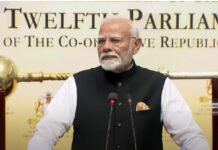Chandigarh: Cigna’s (NYSE:CI) India business, Cigna TTK Health Insurance, a joint venture between U.S.-based global health services company, Cigna Corporation and Indian conglomerate TTK Group, today released the results of its 2018 Cigna 360° Well-Being Survey – Future Assured. The findings reveal that stress levels are high in India compared with other developed and emerging countries including the United States, UK, Germany, France, China, Brazil and Indonesia.
About 89 percent of the population in India say they are suffering from stress compared to the global average of 86 percent. In addition, one in eight people have serious trouble in dealing with stress, with Millennials suffering more than other groups. Nearly, 75 percent of respondents in India do not feel comfortable talking to a medical professional about their stress – cost is one of the biggest barriers to seeking professional help.
Now in its fourth year, the 2018 Survey adopted a more forward-looking approach #Future Assured, exploring people’s perceptions and concerns on health and their sense of well-being across five key areas – physical, family, social, finances and work. This year’s survey is Cigna’s most global yet, talking to nearly 14,500 people in 23 markets around the world.
India takes the top spot in the overall global well-being Index for the fourth year running. The country only showed slight declines in Physical, Social and Family wellness this year, while respondents remain optimistic about Work and Financial well-being. The largest percentage falls are in the Physical area were seen in weight and nutrition management, followed by sleep-related challenges. In the Social pillar, over 50 percent of people from India said they are not spending sufficient time with friends or have enough time for hobbies. The dip in Family well-being is mostly due to growing concerns about the ability to financially support parents and children.
WORKPLACE WELLNESS SCORES HIGH
Work and finances are the key reasons people gave for their high level of stress. However, workplace wellness overall scored high, with about half the respondents saying they have received support and are participating in a workplace wellness program. The majority, 87 percent, said that workplace wellness programs are important in choosing between two potential employers.
While current workplace wellness programs are making stress marginally more manageable, it seems there is still plenty of room for improvement.
“The workplace plays an important role in the health and well-being of an employee. Managing workplace stress is important for corporations, as they can include health and wellness programs in every employee’s benefits package. Employers can offer practical solutions such as flexi-hours or stress management programs that include mental wellness. These benefits can boost employee confidence and make them feel that their role in the workplace is really #Future Assured. At the end of the day, good health equals good business,” said Prasun Sikdar, Managing Director & Chief Executive Officer, Cigna TTK Health Insurance.
FINANCIAL PREPAREDNESS IS A MAJOR CONCERN
The findings show that one in two respondents in India plan to finance their medical expenses from their savings in old age, followed by insurance.
Four in ten people in India have purchased health insurance for themselves. The people who claim to be ready for older age are better at planning; they do regular health checks and own insurance. They are also more likely to be married with children, and a high proportion have full time employment and are more affluent.
HIGH WILLINGNESS TO SHARE HEALTHCARE DATA
In India, private healthcare is perceived to be superior to public care on every aspect, except cost, by a resounding majority. As a result, there is a huge preference for private healthcare in India, with the majority utilizing this system across all medical conditions.
There is also a high willingness to share data in India. Almost 90 percent of those surveyed said that they would be open to sharing their healthcare data, as they see the benefits for better treatment and lower costs. Being clear about how data will be used is crucial, with about half of the respondents saying they would want to know how their data is being utilized.
“Serving the under penetrated market with needs based solutions will continue to play a pivotal role in this sector. We believe that innovation in health insurance is especially important in India, with an increased focus on condition management, blockchain technology, adoption of wearable and portable devices. There are clear advantages from the use of digital health data. As digital health devices evolve, more data will be available about lifestyle and disease management for insurance companies to use proactively”, said Sapna Desai, Head of Marketing and Communications, Cigna TTK Health Insurance
2018 CIGNA 360° WELL-BEING SURVEY – FUTURE ASSURED
The 2018 Cigna 360o Well-being Survey 2018 drew on 14,467 online interviews conducted between February to March 2018, across 23 countries and territories, and can be downloaded https://bit.ly/2u2revW













